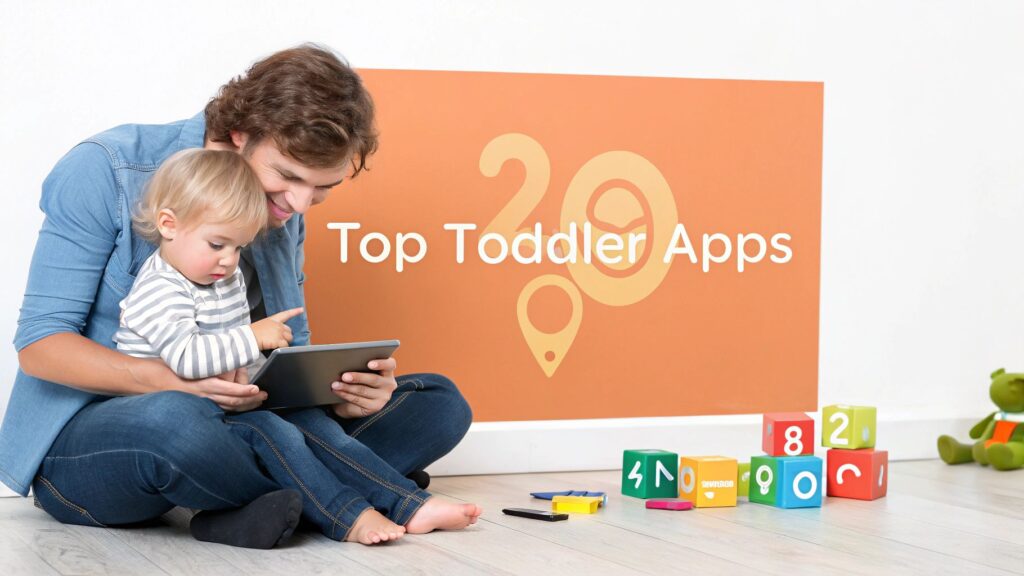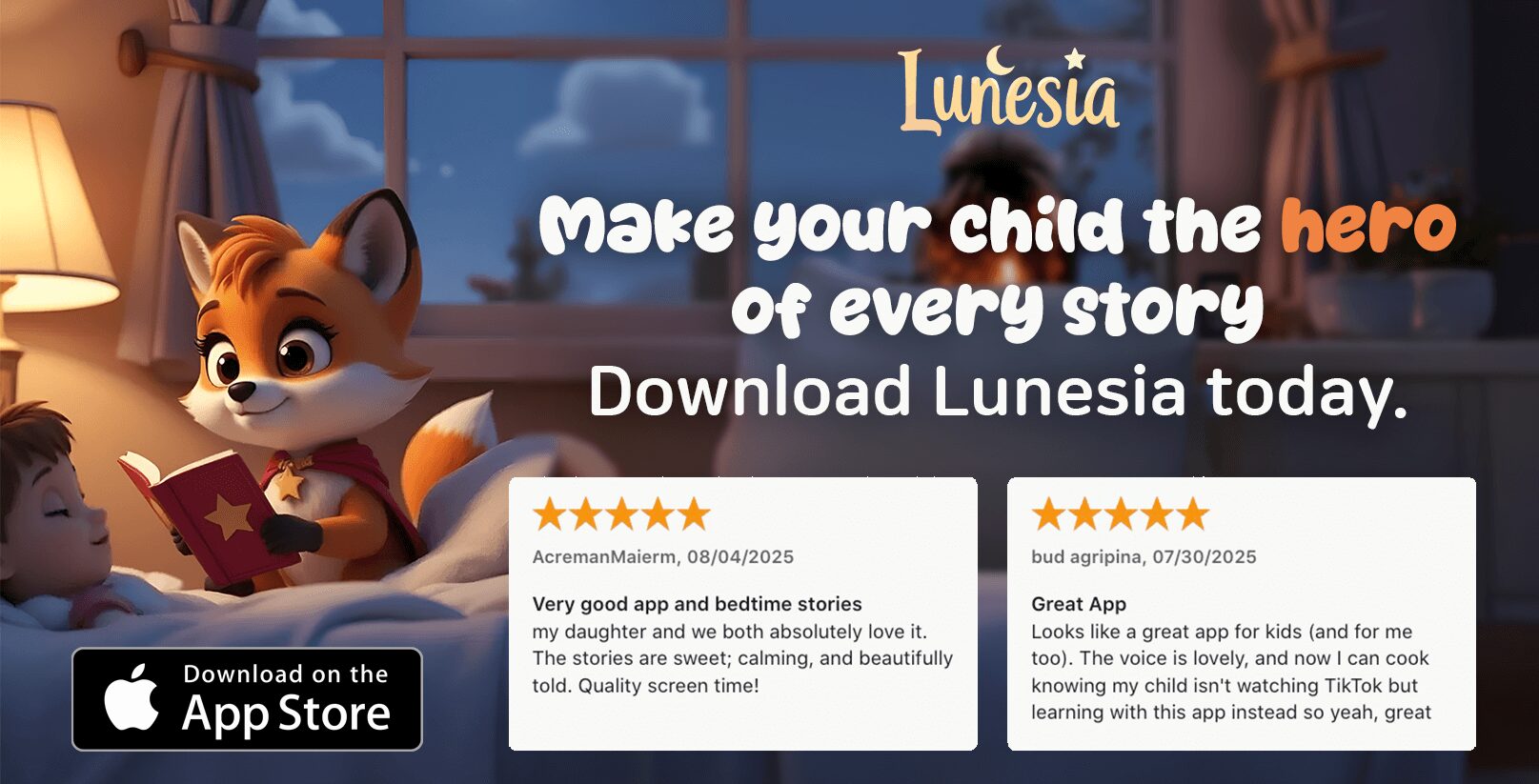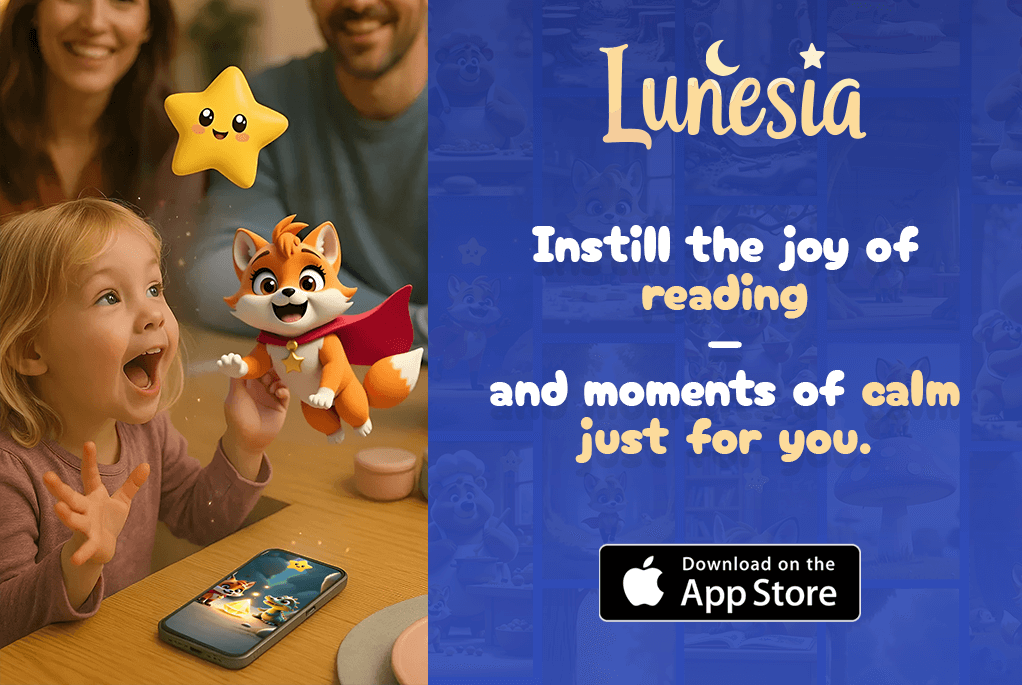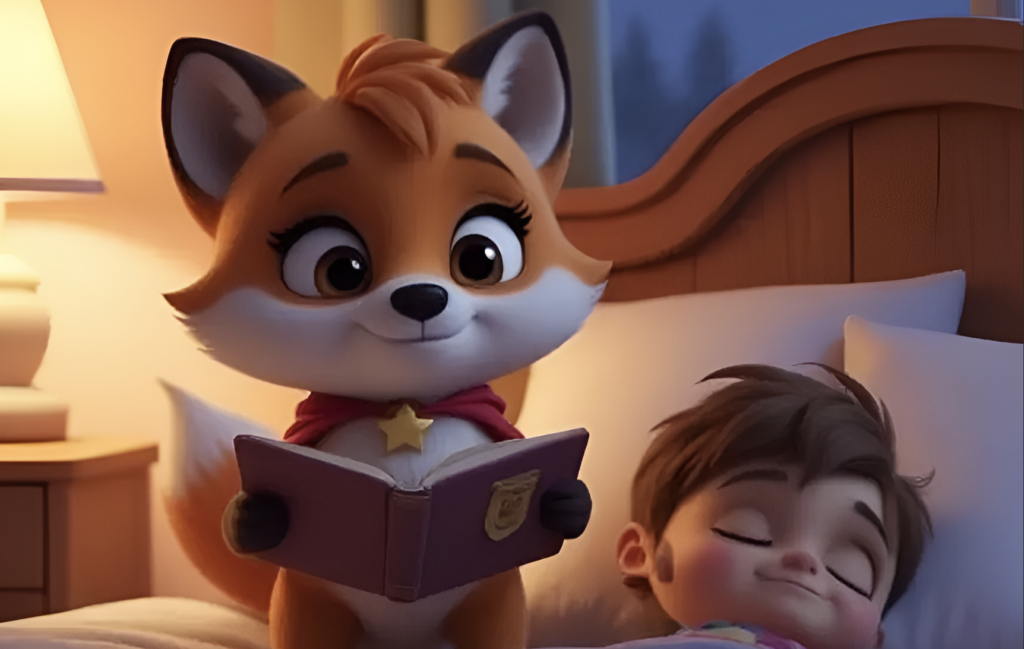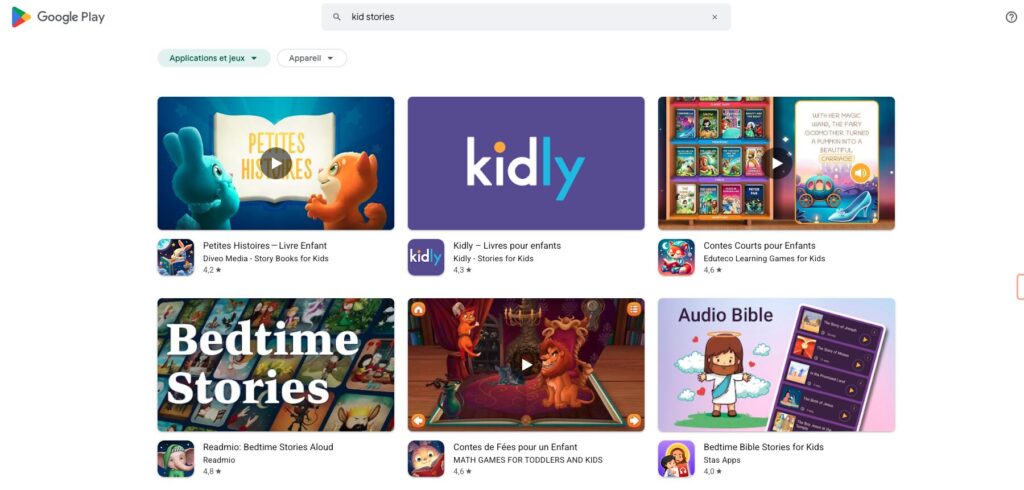Ever feel like finding the right educational app for your three-year-old is a bigger challenge than getting them to eat their vegetables? You're looking for something that’s more than just a digital babysitter, right? Something that actually sparks their brilliant little mind, builds real skills, and maybe—just maybe—buys you five guilt-free minutes to finish your coffee while it’s still hot. But with a million options blinking back at you from the app store, how do you find the true gems?
This guide is your shortcut. We’ve done the deep dive to find the best educational apps for 3 year olds, focusing on what really matters to parents like you: genuine learning, iron-clad safety, and the kind of engagement that makes kids forget they’re even learning. Forget scrolling through endless reviews; we’re giving you the inside scoop on each app's core strengths, what to watch out for, and exactly how it can help you navigate daily life—from taming tantrums with emotional intelligence tools to making car rides a whole lot quieter.
Ready to turn screen time into a powerful tool for growth? We'll explore apps like Lunesia, which uses breathtaking interactive stories to teach kindness and problem-solving, letting your child make choices that actually shape the adventure. You'll get screenshots, direct download links, and practical tips to make the best choice for your family. For parents also outfitting their little explorers for real-world adventures, you might find other helpful resources in pediped's toddler collection for 1-3 year olds. Let’s find the perfect app to support your child’s amazing, ever-expanding world.
1. Lunesia
What if screen time could teach your child not just letters and numbers, but kindness, courage, and how to handle big feelings? Meet Lunesia, an app that redefines storytelling for the digital generation. Instead of passively watching a story, your child becomes the hero, making decisions that steer the adventure. It’s a game-changer for parents looking for one of the best educational apps for 3 year olds, because it builds the foundational skills that matter most: empathy, resilience, and critical thinking.
The magic is in its choice-based narratives. Imagine your child facing a grumpy troll. Do they offer him a snack, tell a joke, or run away? Their choice doesn't just change the story; it teaches them cause and effect in a safe, imaginative space. A recent study found that interactive narratives can boost a child’s problem-solving skills by up to 25%. Lunesia turns this science into enchanting adventures, subtly instilling values that will last a lifetime. And the bonus for you? While your child is safely immersed in a meaningful, ad-free world, you get that precious, guilt-free time back for yourself.
Why It Stands Out
Struggling with a sudden fear of the dark? Or navigating those tricky toddler tantrums? Lunesia has stories that address these exact challenges, giving your child a toolkit for emotional resilience. With over 50 tales and new content weekly, the experience is always fresh. The intuitive interface empowers your preschooler to explore independently, building confidence. And for parents, the 100% ad-free, secure environment is the peace of mind you’ve been looking for. Find out how Lunesia stacks up against other apps for toddlers and preschoolers on their blog.
Key Features:
- Interactive Storylines: Children make choices that directly influence the narrative, fostering decision-making skills and emotional intelligence.
- Vast & Growing Library: Access to over 50 animated adventures with new stories released weekly that tackle real-life challenges.
- Ad-Free & Safe: A secure, private environment designed to protect your child from ads and inappropriate content.
- Independent Navigation: An intuitive interface empowers kids to become the heroes of their own learning journey.
Practical Use Case:
Is bedtime a battle? Instead of another episode of a passive cartoon, try a Lunesia story. It’s a calming, constructive activity that engages their mind and helps them process the day's emotions, transitioning them smoothly into a peaceful sleep. You get a calmer routine, and they build skills while they wind down.
| Feature | Lunesia | Typical Story App |
|---|---|---|
| Interactivity | High: Child-driven choices shape the story. | Low: Passive listening or simple taps. |
| Educational Focus | Holistic: Teaches empathy, problem-solving, and emotional intelligence. | Often limited to vocabulary or basic concepts. |
| Environment | 100% Ad-Free and COPPA-compliant. | Frequently contains ads and in-app purchases. |
| Content Updates | Weekly new stories. | Infrequent or requires new app purchases. |
Pros & Cons
Pros:
- Choice-driven stories actively boost creativity and emotional resilience.
- A constantly refreshed library keeps children engaged long-term.
- Completely ad-free and child-safe for guilt-free screen time.
- Flexible subscription options, including a free trial.
Cons:
- Currently available only in English.
- Android users may need to wait for the Google Play version.
Access: Lunesia is available on the App Store with a free trial. Subscription plans are available monthly or annually, with the yearly plan offering significant savings. Visit the Lunesia website to learn more.
2. Apple App Store (Kids/Education)
Ever hand your iPhone to your toddler for a "quick minute" and come back to find they've somehow ordered a pizza and FaceTimed your boss? For parents with Apple devices, the App Store’s dedicated "Kids" category is your secret weapon. It’s more than a marketplace; it’s a walled garden designed to help you find the best educational apps for 3 year olds without the stress. Simply filter by age, and you're instantly browsing content that’s safe, appropriate, and often, brilliant.
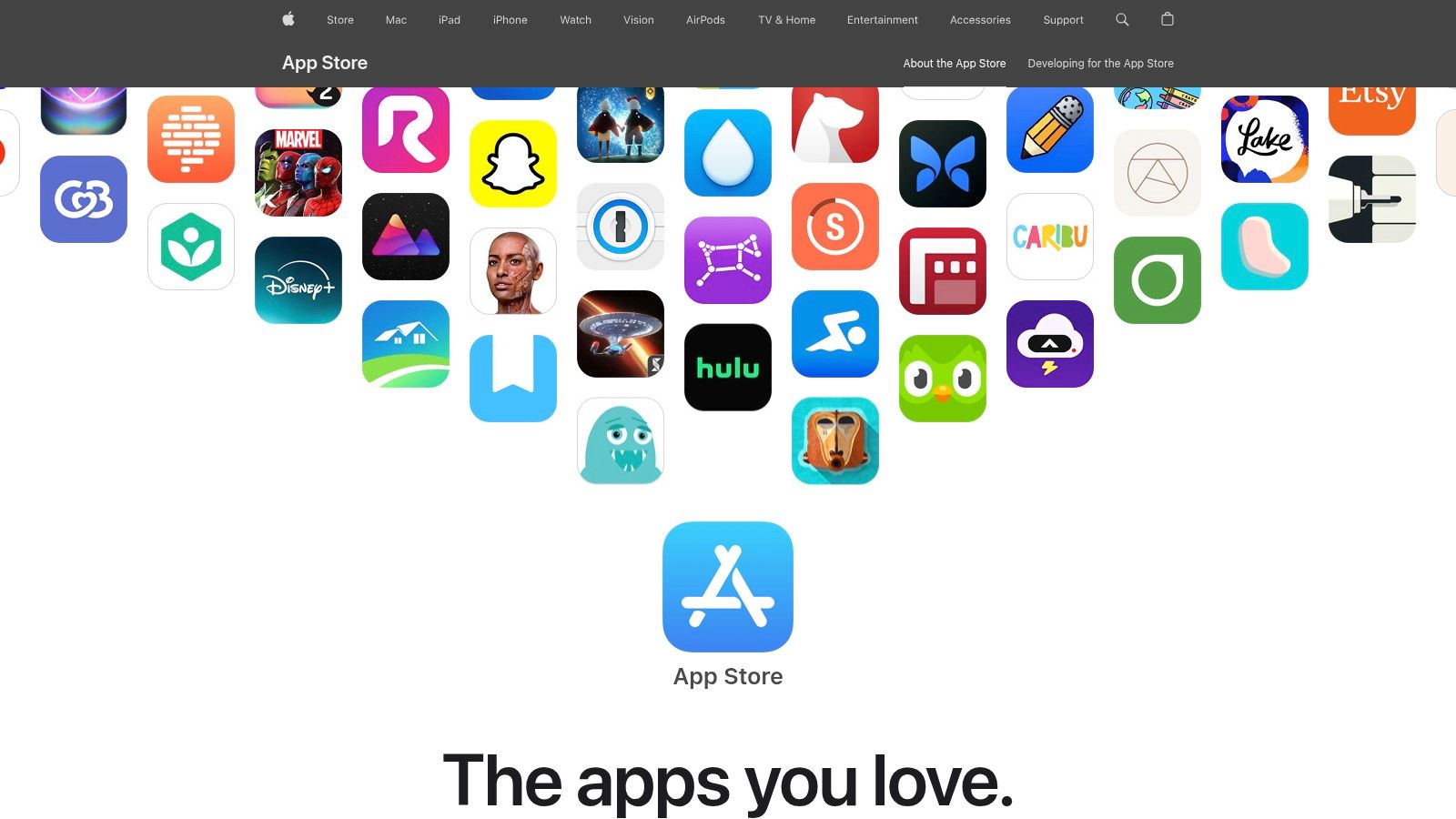
So what’s the real magic here? It's Apple's notoriously strict safety and privacy policies. Every app in the Kids section must have parental gates for any external links or purchases. This means no more accidental shopping sprees. You can confidently let your little one explore, knowing they won’t end up on a weird website or rack up a credit card bill. It’s the digital peace of mind every parent craves.
Navigating the App Store Effectively
Want to become a pro navigator? Use the "5 & Under" filter—it’s your best friend. Before downloading, always glance at the "App Privacy" report on the app's page. It’s a simple breakdown of what data the app collects, putting you in control. Pro tip: look for the "Family Sharing" icon. It lets you share purchased apps with up to six family members, which is a fantastic way to get more value for your money.
- Pros: Strong privacy and safety standards, a vast and high-quality catalog of preschool apps, and excellent parental controls like Screen Time.
- Cons: The quality comes at a price, as many top-tier apps involve in-app purchases or ongoing subscriptions.
Website: https://apps.apple.com
3. Google Play Store (Kids/Teacher Approved)
If your family is team Android, are you just left to fend for yourselves in a digital wild west? Absolutely not. The Google Play Store has a thoughtfully organized hub designed to help you discover the best educational apps for 3 year olds. Head to the "Kids" tab and filter by "Ages 5 & Under." Suddenly, the overwhelming sea of choices becomes a manageable pond of high-quality, developmentally appropriate content.
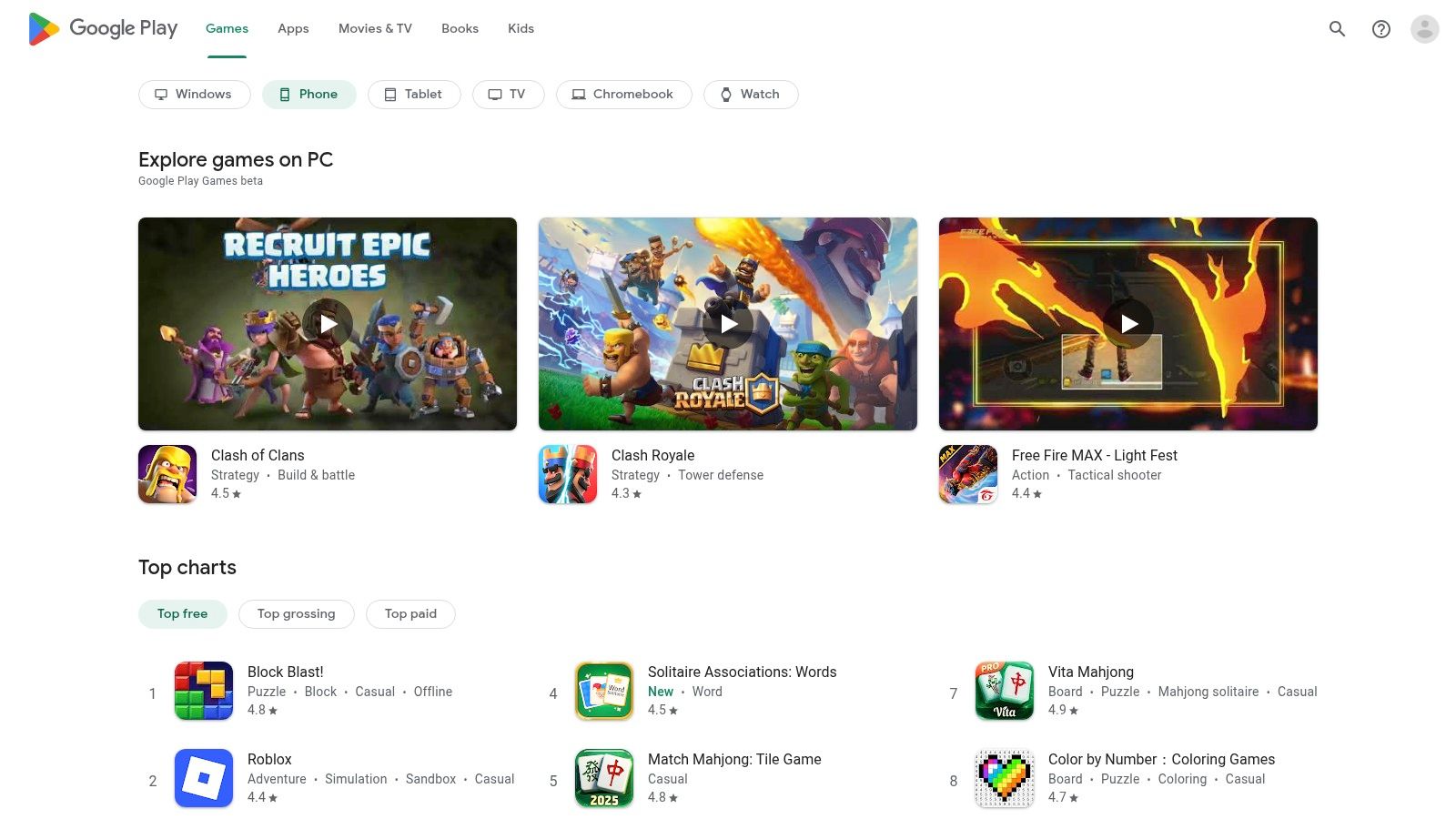
But what’s the one feature that will make you breathe a sigh of relief? The "Teacher approved" badge. This isn’t just a sticker; it's a seal of quality that signals an app has been vetted by academic experts. They check for age-appropriateness, enrichment value, and overall quality of experience. It’s like having a child development specialist personally recommend an app, ensuring your child's screen time is genuinely supporting their growth.
Navigating the Play Store Effectively
Here’s a quick tip for instant success: start in the "Kids" tab and immediately apply the "Ages 5 & Under" filter. See that "Teacher approved" badge? Tap on it to read exactly why the app earned its stripes. For total control, use the Google Family Link app. It lets you set screen time limits, approve downloads, and manage permissions from your own phone. It's the perfect way to give them independence while you hold the reins.
- Pros: The "Teacher approved" program provides excellent, vetted recommendations, and the platform works across a wide range of affordable Android devices.
- Cons: App quality can be inconsistent outside the "Teacher approved" section, so it's important to review ratings and details carefully before installing.
Website: https://play.google.com/store
4. Amazon Kids+ (and Amazon Appstore for Fire tablets)
Do you own a Fire tablet? Then you might be sitting on the ultimate kid-friendly content machine without even realizing it. Amazon Kids+ is a subscription service that transforms your device into a curated educational playground. Think of it as an all-you-can-eat buffet of ad-free books, games, videos, and some of the best educational apps for 3 year olds. For a single monthly fee, you unlock a massive library, saving you from the "can I have this one?" negotiations and endless individual app purchases.
But here's the feature that truly empowers parents: the Parent Dashboard. This isn't just about setting time limits; it’s about setting priorities. You can create educational goals, like requiring 30 minutes of reading before any games or videos are unlocked. It’s a brilliant way to balance learning and fun, creating a completely walled-off environment where your child can explore safely. This is guilt-free screen time, perfected.
Making the Most of Amazon Kids+
Ready to get started? The first thing you should do is create a profile for your 3-year-old and set the age filter from 3 to 4. This ensures they only see relevant, age-appropriate content. Next, dive into the Parent Dashboard and activate the "Learn First" feature. It’s a game-changer for making sure screen time is always productive. Now you can hand over the tablet with confidence, knowing they're in a safe, educational world built just for them.
- Pros: Incredible value with a vast library for one subscription, exceptional parental controls and safety features, and content that grows with your child.
- Cons: The experience is most seamless on Amazon's own Fire tablets, and the monthly subscription price has recently increased.
Website: https://www.amazon.com/amazon-kidsplus
5. Khan Academy Kids (official)
What if you could give your child a world-class early education, designed by Stanford experts, for the grand price of… zero dollars? That’s the promise of Khan Academy Kids, and it absolutely delivers. This non-profit powerhouse offers a stunningly comprehensive curriculum that feels more like play than school. It’s easily one of the best educational apps for 3 year olds because it seamlessly weaves reading, math, and logic with creative play and, crucially, social-emotional skills—all without ads or subscriptions.
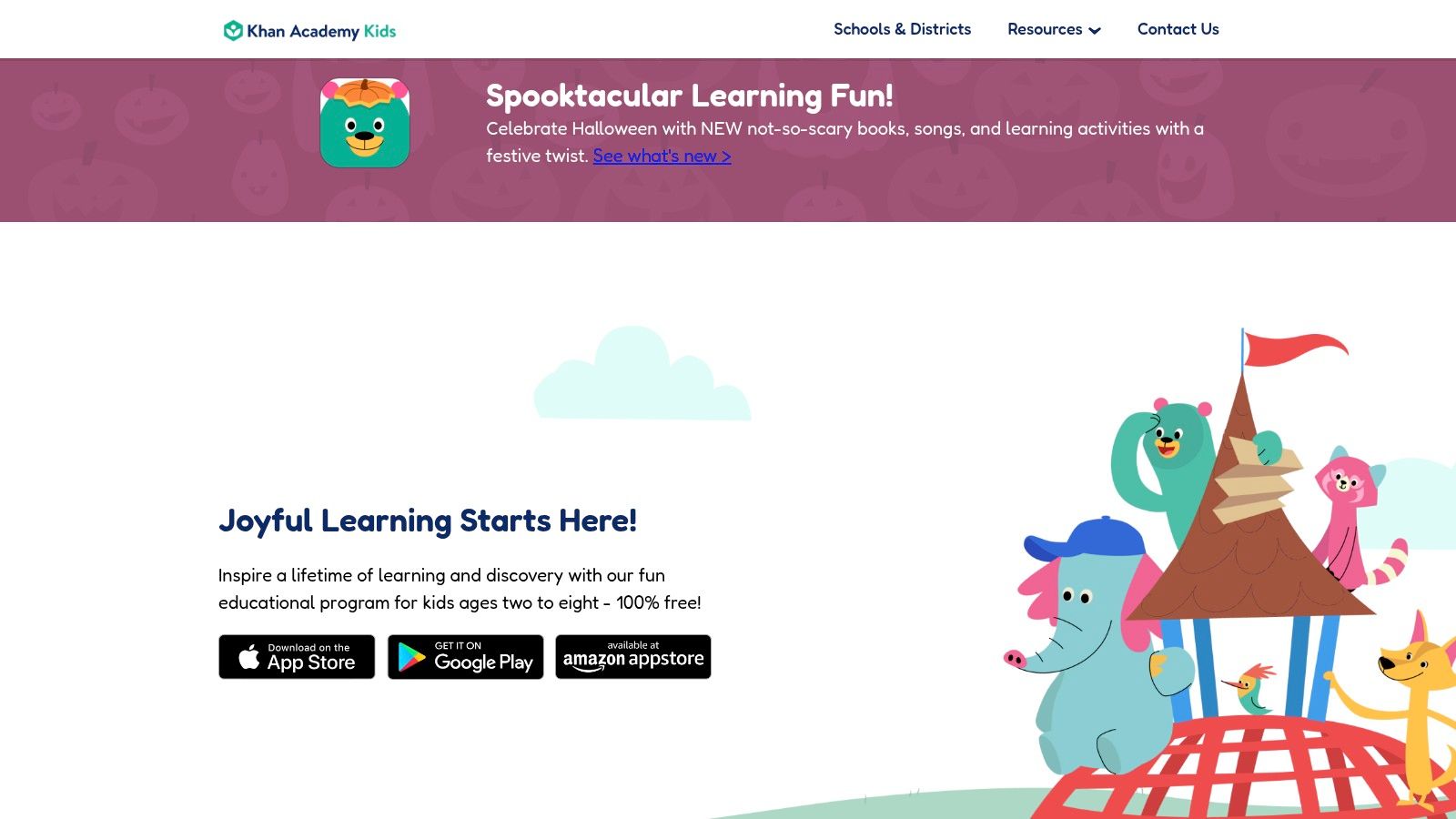
The secret sauce is its adaptive learning path. The app intelligently adjusts the difficulty of activities based on your child's performance, keeping them perfectly challenged but never frustrated. While a cast of adorable animal characters guides them through stories and games, you can relax, knowing the content is research-backed and designed to build a genuine love of learning. It’s everything you want screen time to be, without the price tag.
Getting the Most Out of Khan Academy Kids
To start, let your child explore the "Library," which is a treasure trove of books, videos, and coloring pages. For a more structured approach, guide them along the personalized learning path on the home screen. Here’s a parent-tested tip: before a long car ride or a flight, download a bunch of their favorite activities and books for offline use. It’s the perfect recipe for educational, tantrum-free travel, giving you that much-needed moment of peace.
- Pros: Truly 100% free with no ads or in-app purchases, covers a wide range of subjects, and backed by a highly reputable educational nonprofit.
- Cons: The vast amount of content can sometimes be overwhelming for a 3-year-old, requiring parental guidance to stay focused.
Website: https://learn.khanacademy.org/khan-academy-kids/
6. PBS KIDS Games (official)
Remember the shows you grew up with? PBS has been a trusted friend in family living rooms for decades, and their PBS KIDS Games app brings that same quality and care to your phone or tablet. This app is a goldmine, bundling hundreds of games featuring characters your kids already love, like Daniel Tiger and Alma. Best of all? It’s completely free, with no ads or sneaky in-app purchases, making it a top contender for the best educational apps for 3 year olds.
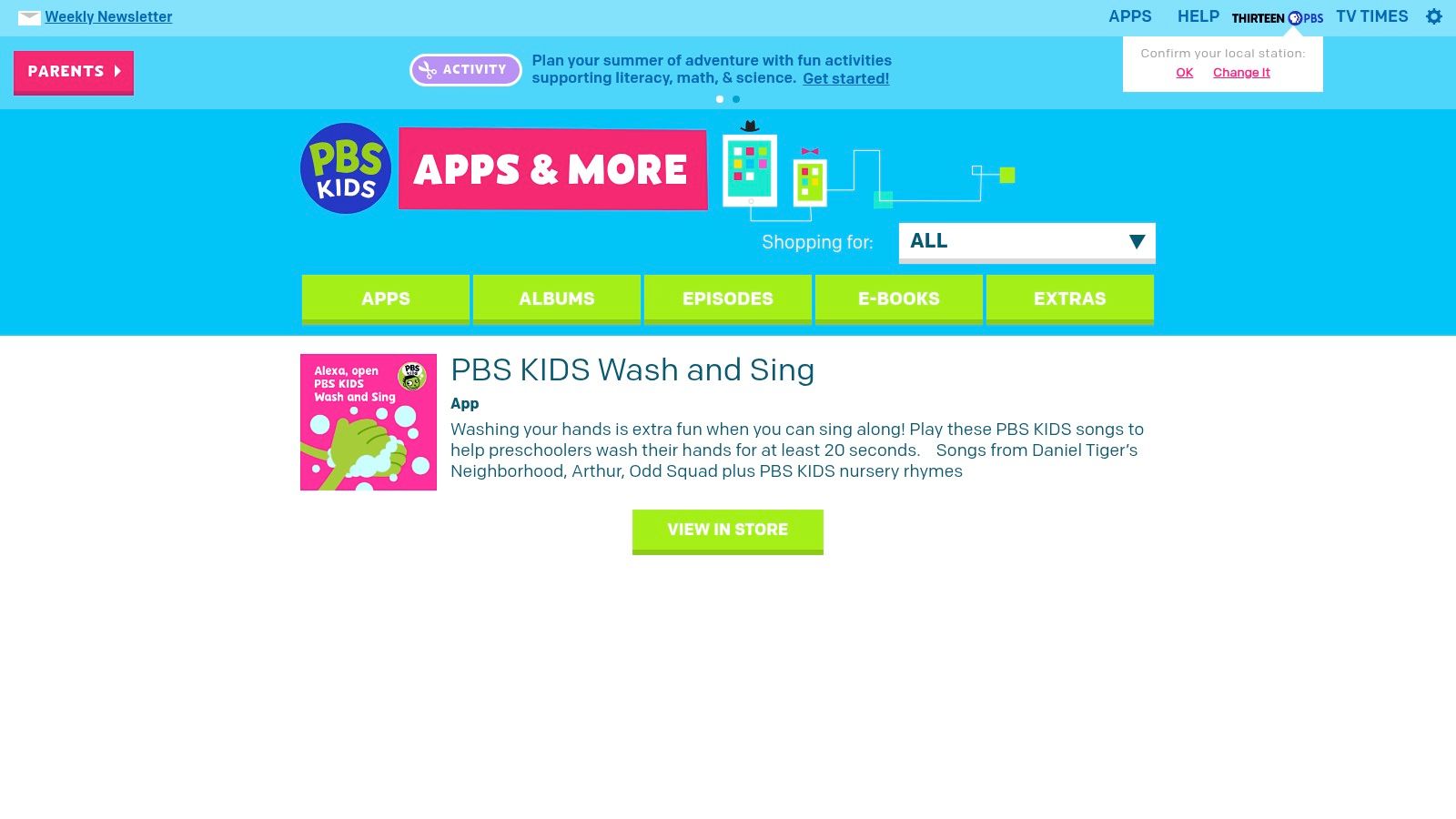
So, what makes these games so special? They're designed with a "whole child" curriculum in mind. A game with Daniel Tiger isn't just a game; it's a gentle lesson on managing disappointment or sharing with a friend. According to the U.S. Department of Education, social-emotional learning is a key predictor of future success. This app brilliantly turns playtime into practice for real-life social situations, helping you raise a kinder, more resilient child.
Getting the Most Out of the App
Want a pro-tip for keeping the peace on the go? Before you leave the house, open the app and download a few of your child's favorite games for offline play. It’s a lifesaver for doctor’s office waiting rooms and long grocery store lines. Also, explore the app with your child. Co-playing and talking about the games—"What do you think Daniel will do next?"—turns a solo activity into a valuable bonding and language-building moment.
- Pros: Completely free with no ads or in-app purchases, huge library of games from a trusted educational brand, and many games support offline play.
- Cons: The large library can feel overwhelming initially, and some users report occasional glitches or storage issues after app updates.
Website: https://pbskids.org/apps
7. ABCmouse (official)
Are you the kind of parent who loves a clear plan and measurable progress? If so, ABCmouse might just be your dream app. Instead of a random collection of games, it provides a full, step-by-step curriculum with over 10,000 activities. The "Learning Path" guides your child from one concept to the next, covering everything from reading and math to science and art. It takes the guesswork out of early education, ensuring a methodical and comprehensive learning journey.
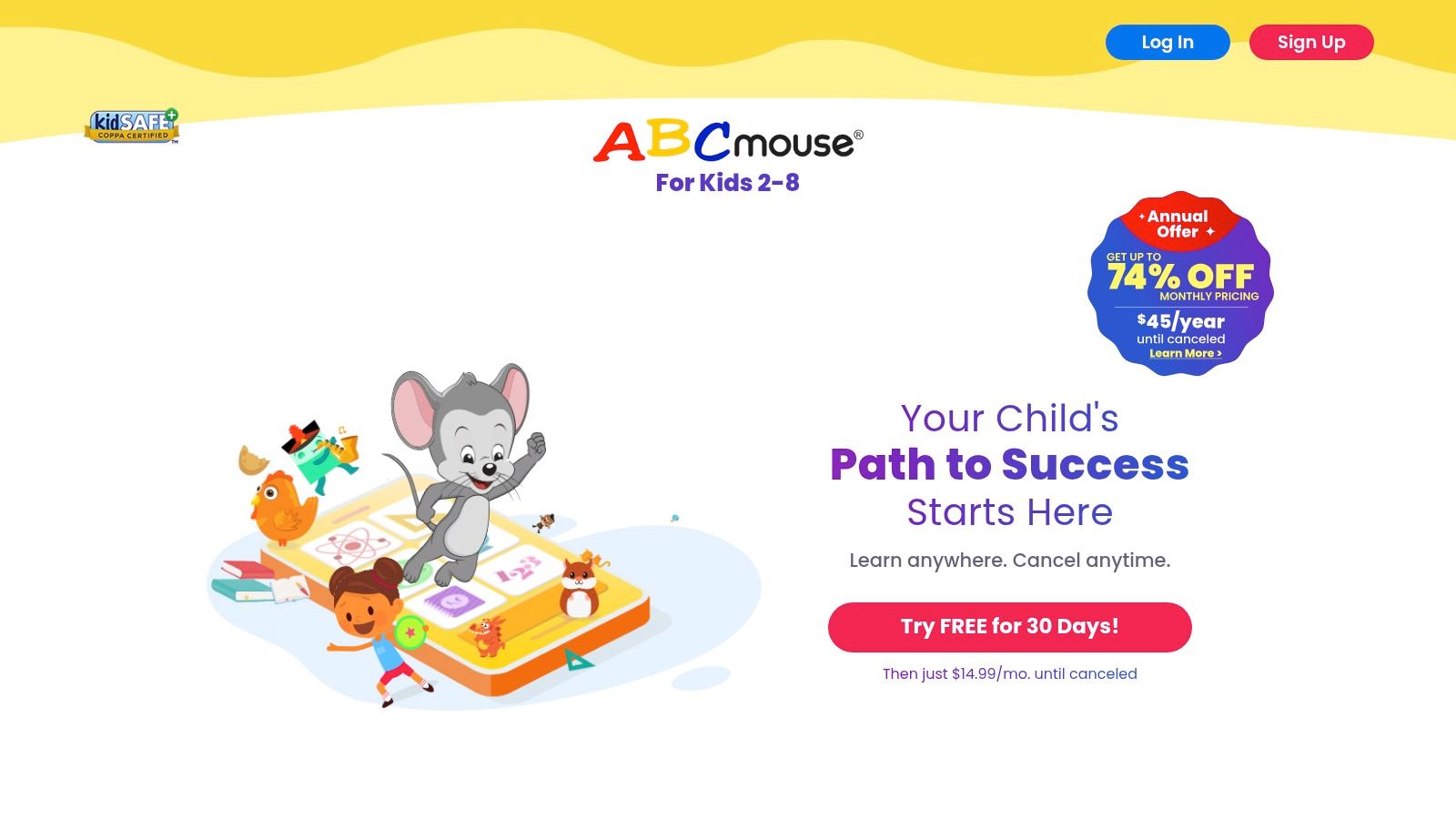
What makes ABCmouse one of the best educational apps for 3 year olds is its incredible breadth and its detailed progress tracking. You can create up to three child profiles, each with its own personalized path. The parent dashboard shows you exactly what they've mastered and where they might need a little extra help. It’s like having a detailed report card, giving you the insights you need to support their learning off-screen.
Making the Most of ABCmouse
Here's how to get the best of both worlds: start your child on the structured "Learning Path," but also encourage them to explore the other zones, like the digital library or the farm. This balances structured learning with child-led discovery. Another practical tip? Download activities for offline use. It’s a lifesaver for keeping them productively occupied during travel without needing Wi-Fi. And always keep an eye out for their promotions—they often offer huge discounts on annual plans.
- Pros: Highly structured Learning Path, covers a vast range of subjects, and supports multiple child profiles with detailed progress tracking.
- Cons: The subscription auto-renews and can be pricey without a promotional discount; some parents find the interface slightly overstimulating.
Website: https://www.abcmouse.com
8. HOMER Learn & Grow (official)
Is your main goal to raise a reader? If so, you need to know about HOMER Learn & Grow. This powerhouse app has a research-backed, personalized pathway that is proven to increase early reading scores. But it doesn't stop there. It also masterfully weaves in early math, social-emotional skills, and creativity, making it one of the most well-rounded and best educational apps for 3 year olds.
HOMER’s secret weapon is its "kid-powered" approach. During setup, you tell the app what your child is passionate about—dinosaurs, princesses, trucks, you name it. It then customizes the lessons around those interests. Think about it: isn't your child far more likely to practice their letters if it means building a rocket ship to the moon? This brilliant strategy keeps them deeply engaged and excited to learn.
Maximizing the Learning Pathway
To unlock HOMER's full potential, be thoughtful during the initial setup questions—this is what tailors the curriculum to your child. Encourage them to explore beyond the main learning path into the creativity space or the digital library to keep things fresh. A great practical use: download a few of their favorite stories or activities before a long car ride. You get a quiet trip, and they get to practice their skills. It turns screen time guilt into a moment of pure parental pride. Explore more about how HOMER and similar apps support early development in our 2025 guide to the best educational apps for toddlers.
- Pros: Highly personalized reading curriculum, kid-friendly interface, proven to increase early reading scores, and supports multiple profiles.
- Cons: Full access requires a subscription, and pricing can vary depending on where you sign up (website vs. app store).
Website: https://www.learnwithhomer.com/learn-and-grow
9. Sago Mini World / Piknik (official)
Does your three-year-old live in a world of make-believe, where stuffed animals have elaborate backstories and cardboard boxes become castles? If you want to nurture that incredible imagination, Sago Mini World is your app. It’s less of a game and more of a digital dollhouse, offering whimsical worlds where kids can create their own stories without rules or goals. It's one of the best educational apps for 3 year olds for fostering pure, unadulterated creativity and problem-solving.
The real magic happens when you get the Piknik subscription bundle. For one price, you get access not just to Sago Mini World, but also to other beloved apps like Toca Boca Jr. and Storybots. It’s an incredible value. The interface is completely intuitive and non-verbal, empowering even the youngest toddlers to play independently and safely. And with no third-party ads, their creative flow is never interrupted.
Maximizing the Sago Mini Experience
Here's how to turn this app into a powerful learning tool: play with them. Sit beside them and ask open-ended questions like, "What adventure is Harvey the dog going on today?" or "Why do you think the robot is feeling sad?" This co-playing transforms screen time into a rich language-building and bonding experience. It’s like a guided tour of their incredible imagination, helping them build narrative skills without them even realizing it.
- Pros: Gentle, creative play perfectly suited for 3-year-olds, an easy-to-use interface with inclusive designs, and the bundle option offers great value.
- Cons: Pricing can vary depending on the platform, and some of the best content is locked behind the subscription.
Website: https://sagominiworld.com/world
10. Toca Boca World (official)
Imagine a digital toy box so massive it has its own city, hospital, vacation resort, and hair salon. That's Toca Boca World. It's the ultimate digital dollhouse, making it one of the best educational apps for 3 year olds who love to imagine, create, and role-play. Kids can design their own characters, build homes, and act out endless stories in a vibrant, interconnected world. There are no rules, no scores, just pure, self-directed play.
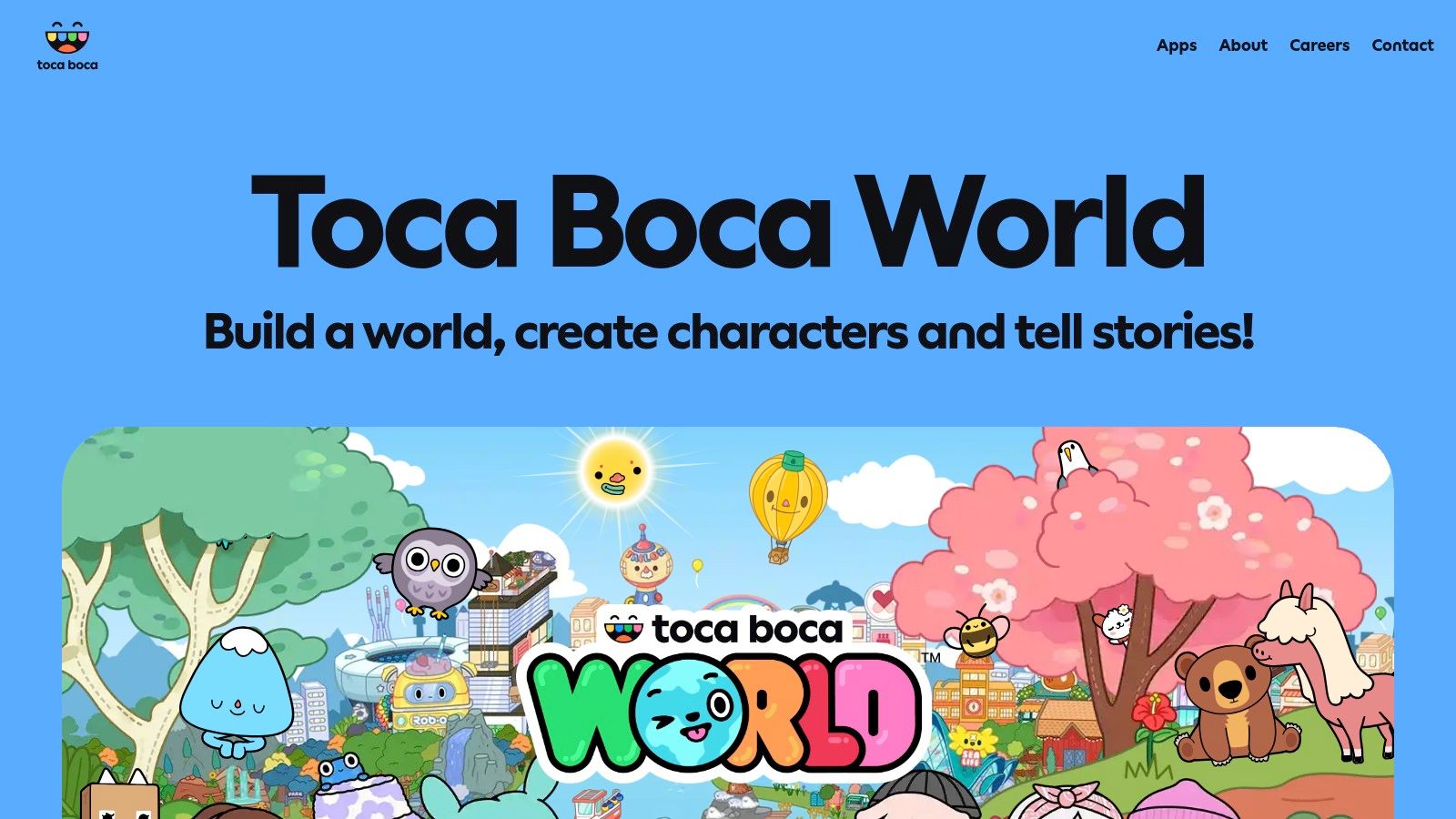
What makes Toca Boca so brilliant is its respect for a child's creativity. The base app is free and comes with a handful of locations and characters, plus weekly gifts to keep things interesting. This "try-before-you-buy" model lets you see if your child connects with the world before you invest in expansion packs. This approach honors a child’s agency and choices, much like how apps such as Lunesia empower kids to guide the story, building confidence and decision-making skills.
Making the Most of the World
To turn this into a learning opportunity, explore the free locations with your child and ask them to tell you a story about what their characters are doing. This is a fantastic way to build narrative skills. When you're ready to expand, browse the shop together. Letting them choose a new location pack based on their interests—like a pet store or a school—becomes a mini-lesson in value and decision-making, all within a safe and fun context.
- Pros: High production quality, extremely engaging pretend play, and you only buy the content packs you want without any loot boxes.
- Cons: The total cost can add up with multiple add-ons, and parental guidance is advised as the store rating is for slightly older kids.
Website: https://www.tocaboca.com/app/world/
11. Reading Eggs (including Reading Eggs Junior for ages 2–4) – official
If you're looking for a no-nonsense, structured path to literacy, Reading Eggs is a proven winner. Its dedicated Reading Eggs Junior program is specifically built for ages 2–4, making it one of the best educational apps for 3 year olds laser-focused on pre-reading skills. This isn't just a collection of random games; it's a carefully sequenced pathway that introduces letter sounds, phonics, and listening skills through catchy songs, videos, and rewarding activities.
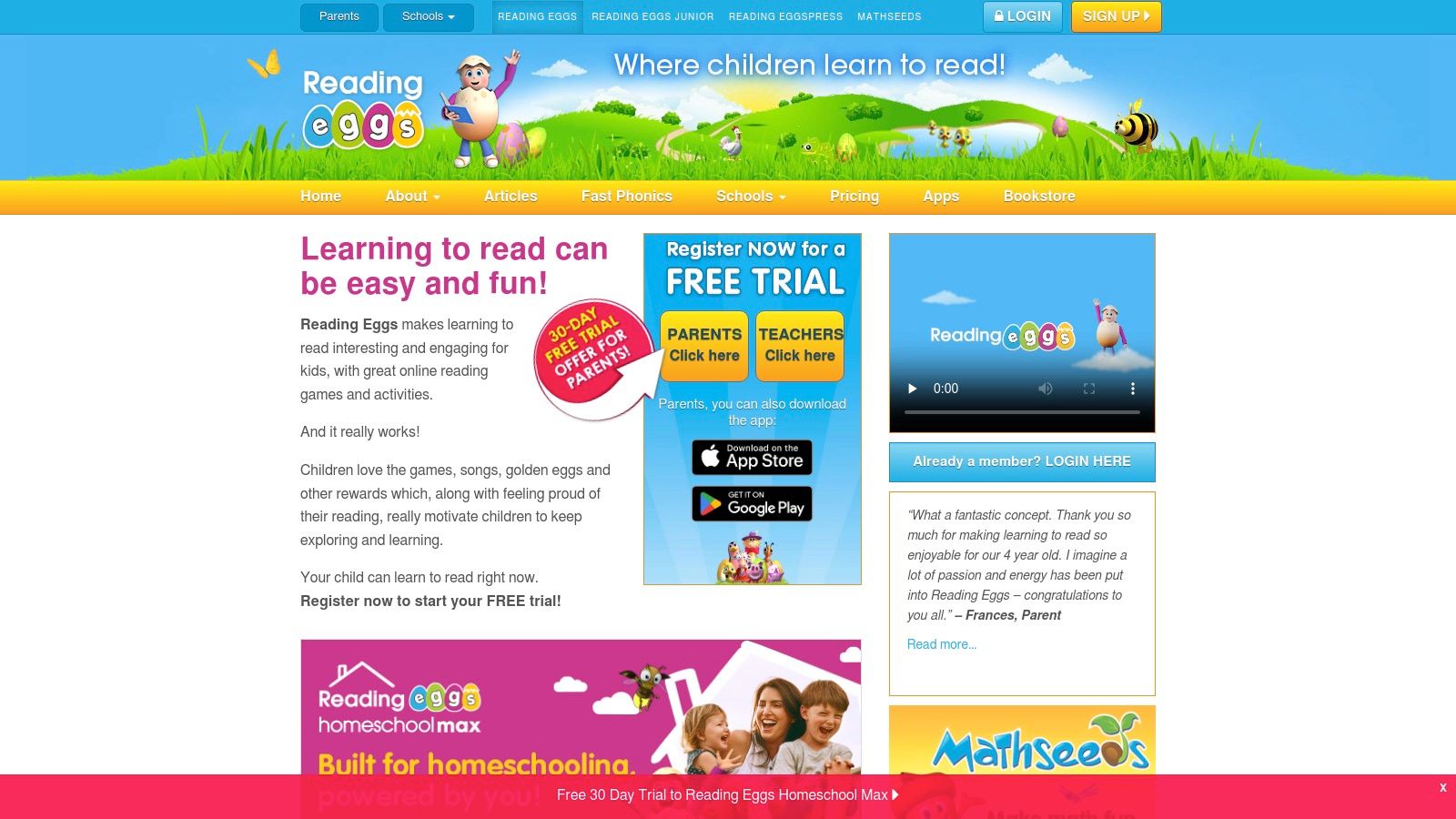
The standout feature for parents is the clear progression and the comprehensive dashboard. At a glance, you can see which letters and sounds your child has mastered and where they might need more practice. This data empowers you to support their learning in the real world. While the interface is more academic than some other apps, its structured approach is incredibly effective at building a strong foundation for reading. For more on how these skills develop, check out these insights into reading comprehension-reading-comprehension).
Getting the Most Out of Your Subscription
Our advice? Start with the generous 30-day free trial to see if the structured format clicks with your child. A single subscription supports up to four children, making it a great value for larger families. Use the parent reports to identify a tricky letter, then make a game of finding that letter on signs during your next trip to the grocery store. This bridges the gap between the screen and their world, cementing the learning.
- Pros: Comprehensive, research-backed curriculum, supports up to 4 children on one account, and offers a generous 30-day free trial.
- Cons: The interface is more structured and less play-oriented than others, and the best value requires an annual subscription commitment.
Website: https://readingeggs.com
12. Common Sense Media (research/compare before you buy)
Feeling dizzy from all the choices? Before you download another app, you need to know about your new best friend: Common Sense Media. This isn’t an app, but rather an essential research tool—the largest independent, nonprofit review site for kids' media. It gives you expert, unbiased reviews that help you find the truly best educational apps for 3 year olds and avoid the duds filled with ads and questionable content.
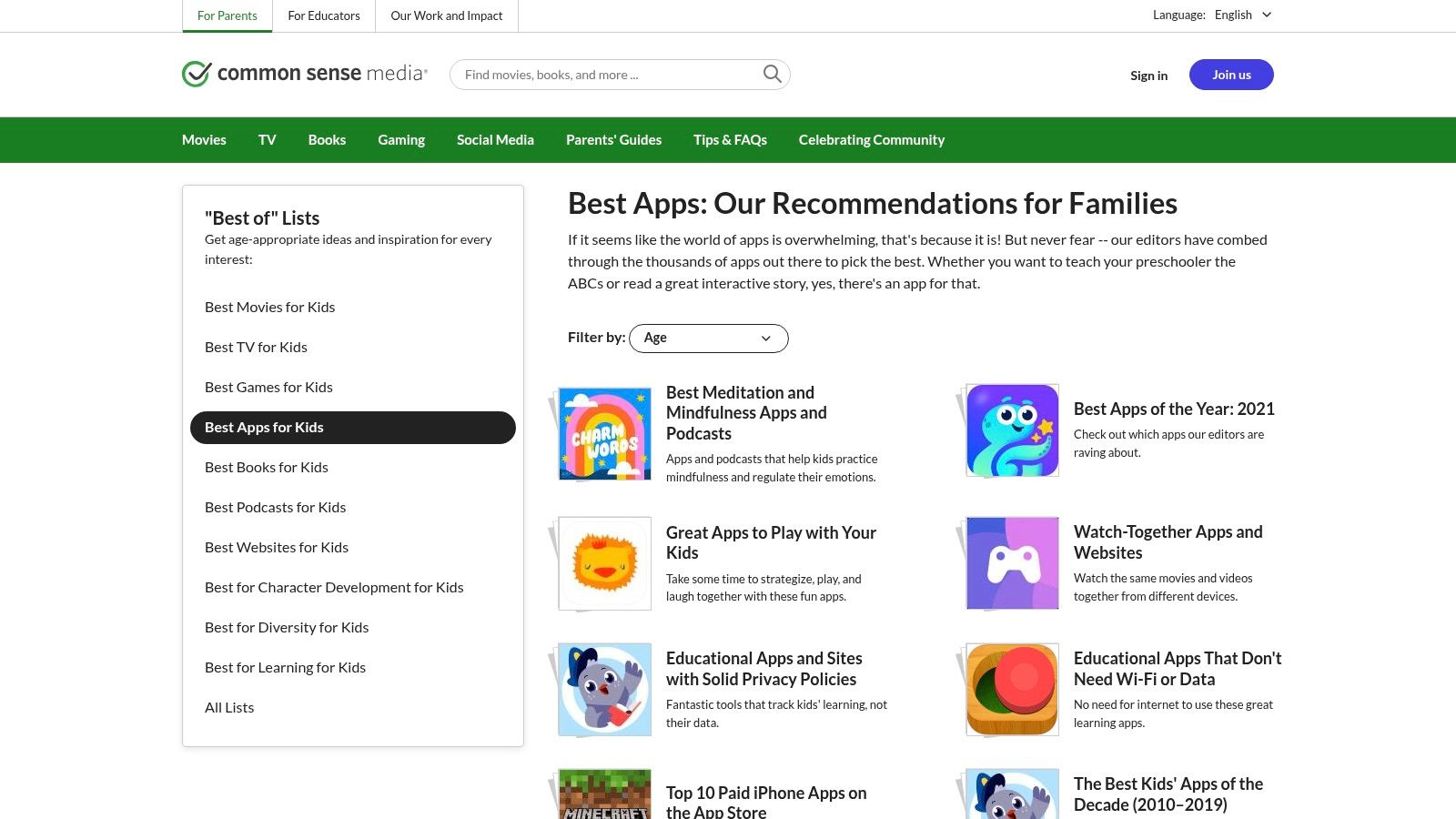
What makes it so indispensable? Its detailed rating system. It doesn't just give stars; it breaks down an app's educational value, positive messages, and ease of use. Crucially, it flags things like consumerism, privacy concerns, or subtle advertising. It gives you the full picture, so you can make confident, informed decisions and finally put that screen time guilt to bed.
How to Use Common Sense Media for Research
Here's how to use it like a pro: start with their curated lists, like "Best Preschool Apps." You can filter the results by age, topic (like creativity or math), and even by specific character-building skills like empathy. Before you commit, read both the expert review and the parent reviews to get a complete picture. Learning how to evaluate educational apps with this tool is a skill that will serve you for years to come.
- Pros: Trusted, unbiased reviews from a US nonprofit, helps you avoid low-quality or inappropriate apps, and is completely free to use.
- Cons: It's a research tool, not a storefront, so you still have to find and download the apps on your respective app store.
Website: https://www.commonsensemedia.org/app-lists
Top 12 Educational Apps for 3-Year-Olds: Feature Comparison
| Product | Core Features / Highlights | User Experience / Quality ★ | Value & Pricing 💰 | Target Audience 👥 | Unique Selling Points ✨ |
|---|---|---|---|---|---|
| 🏆 Lunesia | Interactive stories with 50+ tales, choice-driven narratives | ★★★★★ Ad-free, safe, intuitive for 3-7 y.o. | Transparent subscriptions with free trial, flexible plans | Parents of kids 3-7 | Personalized story choices and vivid animation |
| Apple App Store (Kids/Education) | Age-segmented kids category, strong privacy | ★★★★ Broad preschool app selection | Varies by app; in-app purchases common | iOS families with kids ≤5 | Strict privacy, parental controls |
| Google Play Store (Kids/Teacher Approved) | Teacher-approved apps, Family Link controls | ★★★ Easy Android device access, quality varies | Free apps + Play Pass subscription | Android users, parents & educators | Teacher badges, wide device compatibility |
| Amazon Kids+ | Curated kid content, multi-device support | ★★★★ Large library, strong parental controls | Monthly and annual plans; better value with Prime | Families using Amazon devices | Multi-profile support, extensive kid content |
| Khan Academy Kids | Research-aligned, adaptive learning | ★★★★★ Free, no ads, expert content | 100% free | Parents & educators of ages 2-8 | Fully free, aligned with education standards |
| PBS KIDS Games | Hundreds of curriculum-based games | ★★★★ Free & ad-free, broad preschool coverage | Free | Preschool children 2-6 | Trusted public media brand content |
| ABCmouse | 10,000+ activities, progress tracking | ★★★★ Structured, widely used | Subscription, frequent promotions + free trial | Ages 2-8 children and parents | Broad curriculum, multi-device access |
| HOMER Learn & Grow | Personalized reading & math path | ★★★★ Research-based, award-winning | Subscription required, platform-dependent pricing | Early learners 2-8 | Strong personalized reading focus |
| Sago Mini World / Piknik | Creative play, monthly/annual plans | ★★★ Kid-friendly, inclusive design | Subscription-based | Toddlers & preschoolers | Bundle with popular kid brands |
| Toca Boca World | Open-ended creative play, character creator | ★★★★ High quality, engaging | Free base app + IAP packs | Preschoolers 3-5 | Digital dollhouse with no loot boxes |
| Reading Eggs + Junior | Multi-stage literacy curriculum | ★★★★ Structured, progress tracking | Subscription with 30-day free trial | Toddlers & early readers 2-7 | Clear US pricing, multi-child support |
| Common Sense Media | Editorial reviews and age filters | ★★★★★ Trusted nonprofit, free to browse | Free info (not storefront) | Parents & educators looking to compare | Comprehensive app reviews and guides |
From Screen Time Struggles to Story Time Success
Whew. We've just navigated the vibrant, and yes, sometimes overwhelming, universe of educational apps. From the structured curriculum of ABCmouse to the creative sandboxes of Toca Boca, you now have a map to the very best digital tools for your three-year-old. The goal was never just to find a distraction, but to find a partner in your child's growth—a way to transform screen time into something truly meaningful.
The journey isn't just about downloading an app; it's about making a conscious choice to turn a quiet moment into an opportunity. The right app can turn a fussy afternoon into a creative breakthrough or a tricky bedtime into a calm, connected ritual. It can give your child the tools to navigate their big emotions and give you a moment of peace, guilt-free.
Your Compass for Choosing the Right App
So, how do you make the final call? The "best" app is the one that fits your child’s unique spark and your family’s deepest values. Let's simplify the decision.
- For the Budding Academic: Is your main focus building a strong foundation for school? Platforms like Khan Academy Kids, ABCmouse, and HOMER offer incredible, curriculum-based paths to mastering letters, numbers, and early reading.
- For the Creative Explorer: Does your child thrive on imagination and make-believe? Sago Mini World and Toca Boca World are digital playgrounds where their curiosity is the only guide. These apps build critical thinking by letting them invent their own stories.
- For the Story-Driven Soul: Are you looking to raise a kind, brave, and emotionally intelligent human? An app like Lunesia is in a league of its own. It uses the power of interactive stories to teach the skills that matter most—empathy, resilience, and problem-solving. This is where learning becomes an adventure of the heart.
Turning Good Intentions into Great Habits
Once you've chosen, how do you make it stick? Remember, these are tools, not magic wands. Here are three final, practical tips to make any app more effective:
- Co-Play First: Spend the first few times exploring the app with your child. Your excitement makes it special and helps them understand how it works. This turns it into a bonding activity, not just a solo distraction.
- Set Clear Boundaries: Use your phone’s built-in "Guided Access" or "Screen Pinning" feature to lock them into one app. This creates a safe, focused session and prevents them from wandering off into your email.
- Bridge the Digital and Real Worlds: Did they help a character overcome a fear in a Lunesia story? Talk about a time you both felt brave. Did they learn about circles in Khan Academy? Go on a "circle hunt" around the house. Connecting the screen to their life is what makes learning unforgettable.
Ultimately, finding the best educational apps for 3 year olds is about using technology to amplify your parenting. You're not just looking for a way to fill time; you're looking for a way to build character, spark curiosity, and nurture a happy, confident, and kind little human.
Ready to transform story time into an unforgettable adventure that builds character? Discover how Lunesia empowers your child to become the hero of their own story, making choices that teach empathy, resilience, and problem-solving. Download Lunesia today and start your journey into a world where stories shape futures.
